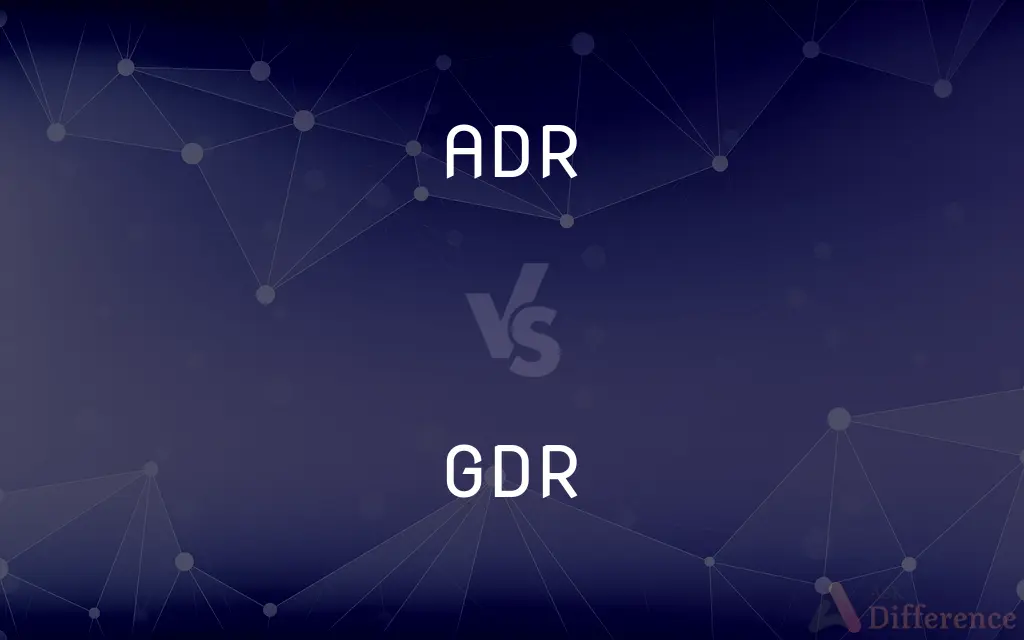ADR vs. GDR — What's the Difference?
By Tayyaba Rehman — Published on December 29, 2023
ADR (American Depositary Receipt) represents shares in a foreign company traded in U.S. markets. GDR (Global Depositary Receipt) is used outside the U.S. to represent foreign shares traded on international markets.

Difference Between ADR and GDR
Table of Contents
ADVERTISEMENT
Key Differences
ADR (American Depositary Receipt) and GDR (Global Depositary Receipt) are both financial instruments that allow investors to own shares in foreign companies without having to buy the actual shares directly. ADRs are specifically for the U.S. market, while GDRs cater to international markets.
ADRs are issued by U.S. depositary banks and are traded on U.S. stock exchanges. They represent the shares of a foreign company in the U.S. stock market. This allows American investors to buy shares in foreign companies in U.S. dollars without the complications of currency conversion or dealing with foreign stock exchanges. On the other hand, GDRs are issued by international banks and can be traded on stock exchanges outside the U.S.
ADRs typically represent one or more shares of a foreign company or a fraction of a share. If an investor owns an ADR, they have the right to obtain the foreign share it represents, but typically, U.S. investors would simply trade the ADR itself. Conversely, GDRs represent a bundled number of shares in a foreign company and are often used by emerging market companies to attract foreign investment.
In essence, both ADR and GDR offer a way for investors to access foreign stocks in a more familiar format. While ADRs make foreign shares accessible for U.S. investors on U.S. exchanges, GDRs do the same for international investors on global exchanges.
Comparison Chart
Primary Market
United States
Global (outside the U.S.)
ADVERTISEMENT
Issued By
U.S. depositary banks
International banks
Currency
Typically U.S. dollars
Varies (Euros, Pounds, etc.)
Used by
U.S. investors
International investors
Represents
Shares in a foreign company
Bundled shares in a foreign company
Compare with Definitions
ADR
A U.S.-traded security for stocks in foreign companies.
Many top Asian companies offer ADRs to attract American investors.
GDR
A bank certificate representing shares in a foreign company traded on global markets.
Investors bought GDRs of the Indian software giant on the London Stock Exchange.
ADR
A method for American investors to access foreign stock markets.
ADRs make it easier for me to diversify my portfolio globally.
GDR
A representation of bundled shares from a foreign corporation for international trade.
Investing in the Middle Eastern firm was possible for me through its GDR.
ADR
A way for foreign firms to list on U.S. exchanges.
The Brazilian energy company listed its ADR on the NASDAQ.
GDR
A certificate issued by banks for shares in foreign companies, traded internationally.
Asian businesses often use GDRs to attract European and other international investors.
ADR
A certificate traded in the U.S. representing a share in a foreign stock.
I bought an ADR of a popular European tech firm on the NYSE.
GDR
An instrument for foreign equities trading outside the issuer's home country.
Through a GDR, European investors gained exposure to African telecom companies.
ADR
An instrument used by U.S. investors to purchase shares in foreign corporations.
Using an ADR, I can invest in overseas companies without dealing with currency conversions.
GDR
A tool for companies to raise capital globally.
The South African mining company issued a GDR to fund its new project.
Common Curiosities
Can GDRs be traded globally?
Yes, GDRs are meant for trading on international markets outside the U.S.
Are ADRs only traded in the U.S.?
Yes, ADRs are specifically designed for trading in the U.S. market.
Who issues ADRs?
ADRs are issued by U.S. depositary banks.
What does ADR stand for?
ADR stands for American Depositary Receipt.
Who is responsible for issuing GDRs?
GDRs are issued by international banks.
Is currency conversion necessary when buying ADRs?
No, ADRs allow U.S. investors to buy shares in U.S. dollars without currency conversion.
In what currencies are GDRs traded?
GDRs can be traded in various currencies, like Euros, Pounds, etc., depending on the exchange.
Do ADRs represent a single foreign share?
An ADR can represent one, multiple, or a fraction of a foreign share, depending on the setup.
What is GDR short for?
GDR stands for Global Depositary Receipt.
Why would a foreign company issue an ADR?
To attract American investors and have a presence on U.S. stock exchanges.
How do GDRs represent foreign shares?
GDRs often represent a bundled number of shares in a foreign company.
Can an individual directly convert ADRs into foreign shares?
Technically, yes. An ADR holder has the right to obtain the foreign share it represents, but it's usually more practical to trade the ADR itself.
What's the advantage for a company to issue GDRs?
To attract international investment and raise capital on global markets.
Which is more global in nature, ADR or GDR?
While ADRs cater to the U.S. market, GDRs have a more global outreach and are traded internationally.
Are GDRs popular among emerging market companies?
Yes, many emerging market companies use GDRs to attract foreign investment.
Share Your Discovery

Previous Comparison
Barrel Rolls vs. Aileron Rolls
Next Comparison
Central Time vs. Eastern TimeAuthor Spotlight
Written by
Tayyaba RehmanTayyaba Rehman is a distinguished writer, currently serving as a primary contributor to askdifference.com. As a researcher in semantics and etymology, Tayyaba's passion for the complexity of languages and their distinctions has found a perfect home on the platform. Tayyaba delves into the intricacies of language, distinguishing between commonly confused words and phrases, thereby providing clarity for readers worldwide.














































